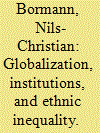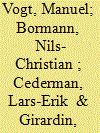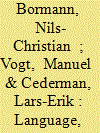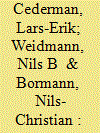|
|
|
Sort Order |
|
|
|
Items / Page
|
|
|
|
|
|
|
| Srl | Item |
| 1 |
ID:
179862


|
|
|
|
|
| Summary/Abstract |
Recent research has shown that inequality between ethnic groups is strongly driven by politics, where powerful groups and elites channel the state's resources toward their constituencies. Most of the existing literature assumes that these politically induced inequalities are static and rarely change over time. We challenge this claim and argue that economic globalization and domestic institutions interact in shaping inequality between groups. In weakly institutionalized states, gains from trade primarily accrue to political insiders and their co-ethnics. By contrast, politically excluded groups gain ground where a capable and meritocratic state apparatus governs trade liberalization. Using nighttime luminosity data from 1992 to 2012 and a global sample of ethnic groups, we show that the gap between politically marginalized groups and their included counterparts has narrowed over time while economic globalization progressed at a steady pace. Our quantitative analysis and four qualitative case narratives show, however, that increasing trade openness is associated with economic gains accruing to excluded groups in only institutionally strong states, as predicted by our theoretical argument. In contrast, the economic gap between ethnopolitical insiders and outsiders remains constant or even widens in weakly institutionalized countries.
|
|
|
|
|
|
|
|
|
|
|
|
|
|
|
|
| 2 |
ID:
141710


|
|
|
|
|
| Summary/Abstract |
This article introduces the new Family of Ethnic Power Relations (EPR) data sets, version 2014, which is the latest in a series of data sets on ethnicity that have stimulated civil war research in the past decade. The EPR Family provides data on ethnic groups’ access to state power, their settlement patterns, links to rebel organizations, transborder ethnic kin relations, and intraethnic cleavages. The new 2014 version does not only extend the data set’s temporal coverage from 2009 to 2013, but it also offers several new features, such as a new measure of regional autonomy that is independent of national-level executive power and a new data set component coding intraethnic identities and cleavages. Moreover, for the first time, detailed documentation of the EPR data is provided through the EPR Atlas. This article presents these novelties in detail and compares the EPR Family 2014 to the most relevant alternative data sets on ethnicity.
|
|
|
|
|
|
|
|
|
|
|
|
|
|
|
|
| 3 |
ID:
152411


|
|
|
|
|
| Summary/Abstract |
Are certain ethnic cleavages more conflict-prone than others? While only few scholars focus on the contents of ethnicity, most of those who do argue that political violence is more likely to occur along religious divisions than linguistic ones. We challenge this claim by analyzing the path from linguistic differences to ethnic civil war along three theoretical steps: (1) the perception of grievances by group members, (2) rebel mobilization, and (3) government accommodation of rebel demands. Our argument is tested with a new data set of ethnic cleavages that records multiple linguistic and religious segments for ethnic groups from 1946 to 2009. Adopting a relational perspective, we assess ethnic differences between potential challengers and the politically dominant group in each country. Our findings indicate that intrastate conflict is more likely within linguistic dyads than among religious ones. Moreover, we find no support for the thesis that Muslim groups are particularly conflict-prone.
|
|
|
|
|
|
|
|
|
|
|
|
|
|
|
|
| 4 |
ID:
161555


|
|
|
|
|
| Summary/Abstract |
Barbara Walter’s application of reputation theory to self-determination movements has advanced our understanding of why many separatist movements result in armed conflict. Walter has shown that governments of multi-ethnic societies often respond to territorial disputes with violence to deter similar future demands by other ethnic groups. When governments grant territorial accommodation to one ethnic group, they encourage other ethnic groups to seek similar concessions. However, a number of recent empirical studies casts doubt on the validity of Walter’s argument. We address recent challenges to the efficacy of reputation building in the context of territorial conflicts by delineating the precise scope conditions of reputation theory. First, we argue that only concessions granted after fighting should trigger additional conflict onsets. Second, the demonstration effects should particularly apply to groups with grievances against the state. We then test the observable implications of our conditional argument for political power-sharing concessions. Using a global sample of ethnic groups in 120 states between 1946 and 2013, we find support for our arguments. Our theoretical framework enables us to identify the conditions under which different types of governmental concessions are likely to trigger future conflicts, and thus has important implications for conflict resolution.
|
|
|
|
|
|
|
|
|
|
|
|
|
|
|
|
| 5 |
ID:
142046


|
|
|
|
|
| Summary/Abstract |
Does economic inequality cause civil war? Deviating from individualist measures of inequality such as the Gini coefficient, recent studies have found a statistical link between group-level inequalities and conflict onset. Yet, this connection remains controversial, not least because of the difficulties associated with conceptualizing and measuring group-level differences in development. In an effort to overcome weaknesses afflicting specific methods of measurement, we introduce a new composite indicator that exploits the strengths of three sources of data. The first step of our method combines geocoded data from the G-Econ project with night lights emissions data from satellites. In a second step, we bring together the combined spatial values with survey estimates in order to arrive at an improved measure of group-level inequality that is both more accurate and more robust than any one of the component measures. We evaluate the effect of the combined indicator and its components on the onset of civil violence. As expected, the combined index yields stronger results as more information becomes available, thus confirming the initial hypothesis that horizontal economic inequality does drive conflict in the case of groups that are relatively poor compared to the country average. Furthermore, these findings appear to be considerably more robust than those relying on a single data source.
|
|
|
|
|
|
|
|
|
|
|
|
|
|
|
|
|
|
|
|
|